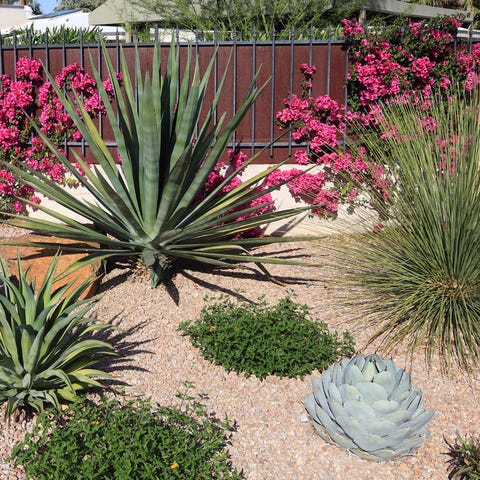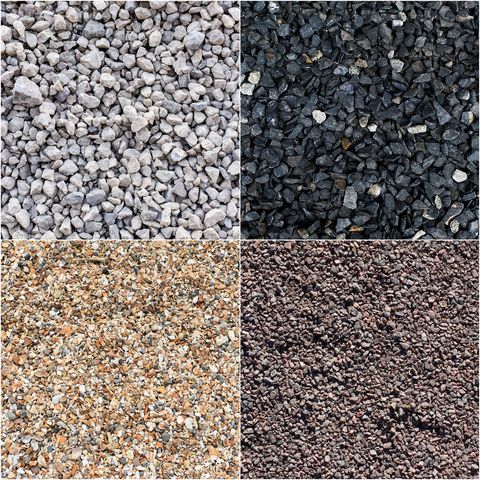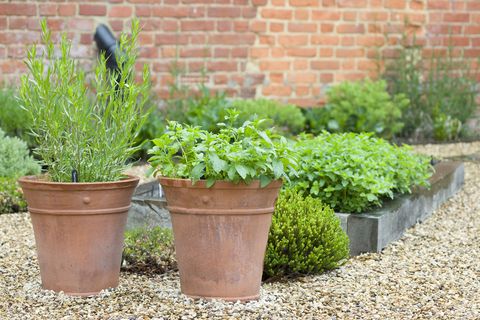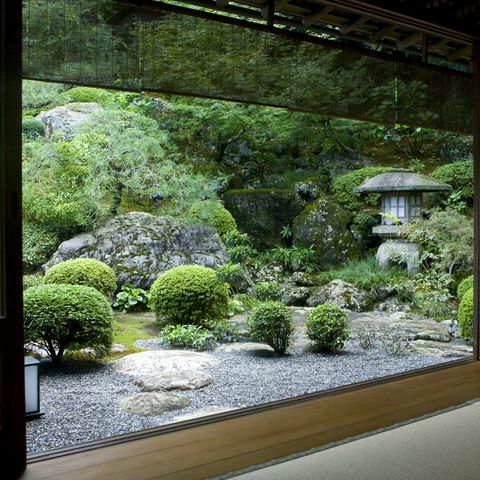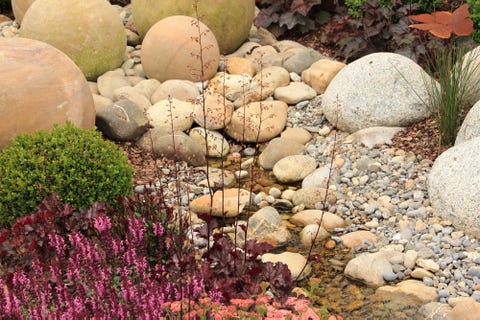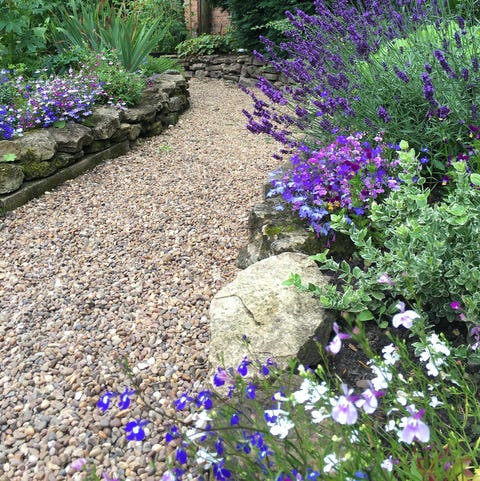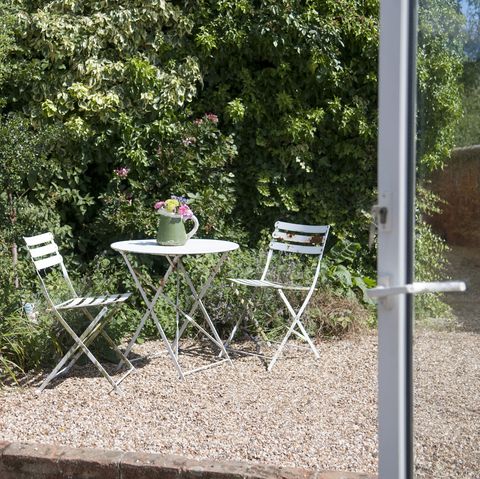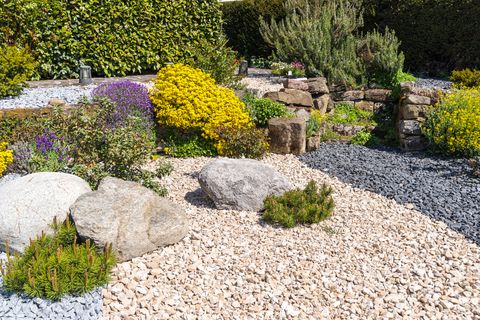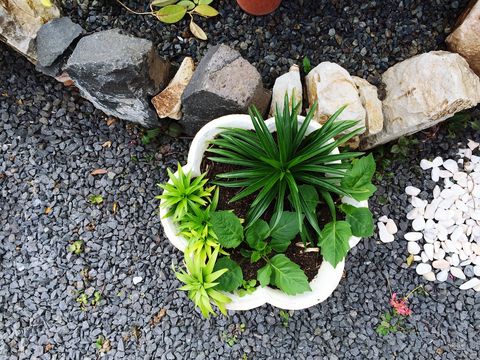7 Gravel Garden Ideas: Design, Planting and Maintenance
A gravel garden that doesn’t require much watering is an attractive idea for many. But gardeners aren’t getting into gravel just for its resiliency. When covered in a patchwork carpet of alpines, sedums and drought-tolerant beauties, gravel gardens can look fabulous too. They are ideal for sunny spots where you can create a Mediterranean style space with minimal watering required, but you can also make them work in shade.
The advantages of a gravel garden
As drought and hosepipe bans become more common, gardeners across the UK may have to embrace the practice of xeroscaping (a style of landscaping which reduces the need for irrigation), which is common on the west coast of the USA. But you don’t necessarily need the sunny climate of LA to create a thriving gravel garden. A well constructed gravel garden will have good drainage – so shouldn’t mind a bit of British rain.
The advantages of a gravel garden are many. Where a lawn turns yellow and parched without water, a gravel garden can flourish, providing year round interest. And where astroturf heats up, gravel reflects the sun and moderates the soil temperature.
What’s more, the style of garden is great for anyone whose ears prick up at the sound of low maintenance garden ideas. Once established you’ll find you’re spending less time on weeding and pest control and more time with a coffee (or cocktail) in hand enjoying your outside space.
A gravel garden is preferable to paving when it comes to the environment. Using a permeable aggregate like gravel slows erosion, reduces run-off and improves drainage and water retention – ultimately reducing flood risks. Sound good? Here’s everything you need to know about creating your perfect gravel garden.
Gravel garden ideas: Choosing the right gravel
Size it right
When it comes to choosing the right gravel for your gravel garden, size matters. As Beth Chatto discovers in The Dry Garden, too small and it gets stuck in your shoes, too big and it becomes impossible to walk on or roll a wheelbarrow over.
We recommend choosing gravel that is a maximum of 10mm in size. The finer your gravel, the more it will stray from your chosen area, so if you prefer small over chunky consider using a gravel edging. Get creative with reclaimed wood (old fence panels or pallet wood works well), pebbles, or even upturned wine bottles – depending on what you have to hand or try one of these garden edging ideas.
Your top layer of gravel should be around four inches deep. This will help keep soggy roots at bay and generally, the rule of thumb is to use a tonne of gravel for every 12 square metres.
Is gravel sustainable?
Gravel is often touted as a good idea for the eco-friendly gardener. It doesn’t exacerbate flooding or contribute to the urban heat island effect like paving or concrete. It’s also better for wildlife than laying a plastic sheet of habitat-wrecking, fossil fuel-based astro turf.
However, garden designer Jack Wallington thinks we shouldn’t all be rushing to rip our lawns out: “No, the lawn is not bad, it’s in fact quite important. It beats most patios and gravels because it’s alive; alive itself and with life, actively using and storing carbon.”
So, work with what you have rather than trying to alter your soil type to suit a gravel garden. If you’ve got lots of shade and heavy soil you might want to consider a woodland garden style instead.
Location, location, location
There’s also the matter of how gravel is excavated. For gravel with rock-hard eco credentials, use suppliers certified with the Ethical Stone Register and buy from a trusted local source.
Avoid gravel which has been dredged from the seabed, where it contributes to coastal erosion and destruction of marine life. Instead, opt for recycled varieties like the crushed concrete found at the award winning Grow2Know Chelsea Flower Show garden. These are usually made from a mixture of construction materials, including crushed concrete, brick and reclaimed gravel.
Alternatively, recycled slate chippings can add sophistication to your plot while making use of a byproduct of the roofing slate industry. Pea gravel tends to be softer underfoot so more child and pet-friendly.
Should you opt for a gravel membrane or not?
A lot of advice you’ll read on how to make a gravel garden will suggest using a weed suppressant membrane. If you go down this route, choose a permeable matting. Plastic-free alternatives available include Ecotex MulchMat and the cornstarch based Mulch Organic.
But, do you really need membrane under gravel? Perhaps not, if Highfield Farm in Monmouthshire is anything to go by. The owners used a membrane on one side of their gravel garden and left the other half membrane-free. The result: the side without the membrane had more vigorous growth. Plus, without the matting, you get a more natural-looking, freestyle garden with selfseeders. So we’d forgo it and spend the money in the garden centre instead, which brings us to the fun part: choosing your planting scheme.
7 gravel garden ideas
1. The herb garden
Please the cook in your house and bring a splash of the Mediterranean to your patch with a fragrant herb garden that tastes as good as it looks. Create a backdrop of earthy tones with golden gravel, weathered second hand terracotta and whitewashed walls.
Choose Mediterranean herbs like thymes, rosemary, marjoram, sage and oregano – all of which thrive in a sun-drenched spot with free draining, poor soil. Add drought-tolerant fennel and taller varieties of yarrow for height or go big with stately junipers. In this style of garden, gravel has the added benefit of reflecting the sun and warming up the plants – handy if you’re growing herbs in an area which isn’t blessed with oodles of sunshine.
2. The zen garden
Want a space to relax, meditate and escape the daily stress? Create a minimalistic Japanese-style garden with fine gravel in pale hues, a few well-placed boulders and an unfussy planting scheme which incorporates a water feature or pond.
Plant evergreens such as pine trees whose needle-shaped leaves add scent and texture, while acers provide a fiery pop of colour and cherry blossom softens the vibe. The zen garden works well if you can provide moist shady spots where mosses, hare’s foot ferns, hepaticas and Saxifraga cuneifolia can thrive. (Fun fact: saxifraga stems from the Latin for ‘stone-breaker’ so a good option for your rockery).
Plus, swapping the roar of a lawn mower for the gentle strokes of a rake will no doubt keep your neighbours happy too. Though perhaps don’t bother with those pristine gravel-waves if you’ve got young kids or pets.
Read our top tips on how to feng shui your garden here.
3. The rockery
Super charge your gravel garden with the addition of larger boulders scattered throughout to inject some texture, depth and fun to your outside space. A naturally sloping garden is ideal for a rockery as it will already be blessed with that all-important drainage. To create your rocky oasis, opt for alpine plants which are used to roughing it on mountain tops or clinging to cliff faces. Gardening connoisseur Chris Young says: “Think tiny when it comes to your rock garden plants. Smaller bulbs are a nice choice — especially small daffodils, wild tulip species, blue eyed grass or brodiaea.”
Add primulas in the crevices of your rockery for pretty bursts of colour. Low growing sprawlers like creeping thyme are a useful ground cover. Plant in cracks along a pathway to enjoy that aromatic hit as you meander around your garden. Just make sure you position any big boulders exactly where you want them first as they’ll be heavy to move later.
4. The gravel path
Traverse your garden in style with a gravel path. Add interest with clay stepping stones, scaff boards or mix things up with a mosaic of different gravels. Check Pinterest for reams of gravel path inspiration. If going for slabs, leave space between them to squeeze in extra plants. A straight path leading to a focal point like a seating area or water feature works well but you can also add mystery and create the illusion of space with a winding gravel path (think along the lines of the RHS Forest Bathing Garden created by Dave Green).
Use your hosepipe to map out the curves you want to create. To ramp up the tactile quality, line your path with ornamental grasses. Great grasses for gravel gardens include miscanthus, pennisetum and stipas. Finally, create a lasting impression with gravel or stone steps punctuated with mounds of erigeron, rock soapwort or adriatic bellflower.
5. Courtyard garden
Got a suntrap seating area enclosed on all sides? A lick of white paint and the right planting can instantly add a touch of romance to your garden. Alliums and lavenders thrive on light, sandy soils and will attract pollinators to your patch, while sun-loving agapanthus ‘Northern Star’ gives your border some oomph. Don’t be afraid to incorporate small trees into your courtyard scheme. Arbutus unedo, the strawberry tree, is a gorgeous edible addition which can be grown in a pot in a sunny position. It’s fruit makes an excellent jam and the birds love it too.
6. The gravelled front garden
When it comes to kerb appeal, millions of people across the UK are bumping flowers for four-wheel drives, but with a gravel garden you can have both. When it comes to the type of gravel for your front garden, Gravel Master says: “We recommend that you use a 20mm sized gravel as this is easy to walk on, stand the weight of car tyres and will not scatter about. A 10mm gravel may get stuck in tyre treads and any aggregate larger than 20mm will be difficult to walk on.”
Plants that can withstand a bit of trampling include acaenas and creeping thyme. Thymus coccineus group has magenta blooms and pleasingly releases its scent with passing footfall. To brighten up a partially shaded spot, try creeping dogwood or phlox stolonifera ‘Ariane’ or try Ficaria verna ‘Coppernob’ for a cheerful carpet of sunset-orange blooms.
Ready to transform your front garden? Try these 9 ideas for a more welcoming entrance
7. Container gravel gardens
If your gardening space amounts to a small patio, balcony or window ledge, or you’ve been dealt a soil that’s heavy, clay-based, damp or waterlogged, there are plenty of small gravel garden ideas you can try out.
Raised rockery beds, pots and troughs filled with free-draining soil and horticultural grit can make a pretty home for alpines. Check out Beth Chatto’s alpine collection for inspo.
Slate chips placed upright in a pot with a mix of sand and free draining soil can mimic natural crevices (and are fun to get kids involved with). A top tip from the authors of The Crevice Garden is to create a mound with your soil and materials. The idea is to replicate “a mini-mountainous terrain and allow a deep root run” rather than adding rocks to a flat layer of soil. You can also create fun displays with bricks with holes for your chosen vegetation or broken terracotta pots.
How about selecting a few varieties of house leek or small alpines? Just remember gravel gardens with pots of a similar colour or type keep your design consistent while showing off your plants. Complete your miniature gravel garden with a top dressing of Shell on Earth’s recycled seashells.

